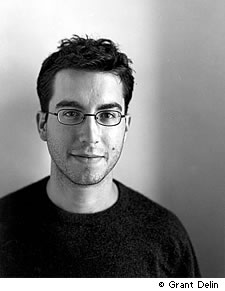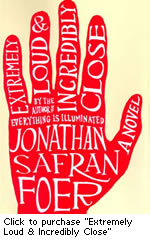No one could accuse Jonathan Safran Foer of being a miniaturist; his books grope at large themes and big stories. Perhaps the same could be said of his artistic ambitions. In 1999, Jonathan Safran Foer traveled to the Ukraine to research his grandfather’s life. The trip resulted in his first novel, Everything is Illuminated, an international bestseller that was made into a film directed by Liev Schreiber and starring Elijah Wood, which is due in theatres on September 16. This spring marked the arrival of his much-anticipated follow-up novel, Extremely Loud and Incredibly Close. There is no subject larger in contemporary western consciousness, or political landscape, than September 11. Foer has joined writers such as Ian McEwen, Patrick McGrath, Russell Banks and Michael Cunningham by drawing the attacks into his literary world so that the rest of us may begin to digest the gruesome, the heartbreaking and the unthinkable.
Extremely Loud and Incredibly Close follows Oskar Schell, a compulsively curious nine-year-old who is on a quest to find the lock that fits a mysterious key belonging to his father, who died on September 11. In addition to introducing the usual motley characters that populate any big city, the story wanders far afield to the bombings of Dresden and Hiroshima. Oskar’s search ends in a tragic meeting that is, as Oskar would say, also beautiful and true. Foer continues his penchant for visual elements, concluding Extremely Loud and Incredibly Close with what Booklist calls “undoubtedly the most beautiful and heartbreaking flip book in all of literature.”
Foer recently finished a libretto commissioned by the German National Opera House in Berlin. The opera, Seven Attempted Escapes from Silence, will premiere just two days before his movie. I spoke with him by phone.
—Joel Whitney

Guernica: Both your books start with a narrator who is practicing, in a sense, improvising, riffing. Is that fair?
Jonathan Safran Foer: That they are practicing?
Guernica: Yes. Alex practices his English in Everything is Illuminated. And Oskar Schell in your new novel, Extremely Loud and Incredibly Close, seems to be practicing everything he knows from school – French, physics, psychology, biology – and everything he’s learned from his dad.
Jonathan Safran Foer: Right, right. Well, in a way, maybe that’s true of every character in a book… [Alex and Oskar] both sort of wear themselves on their sleeves. They definitely don’t make any effort to hide what they don’t know or to hide their inexperience. I think what we get to see in both cases is the distance between them and us. To me, at least writing it, that’s what made them both very funny, and sympathetic, and it’s sort of how I ended up identifying. The distance between us, which I thought was very great in the beginning, becomes less great. You know, everybody has a problem saying what he needs to say, like Alex. And everybody can remember what it’s like to be an exposed nerve in the way that Oskar is.
I was trying to make somebody who evoked a certain set of feelings.
Guernica: And it seems that starting with these characters, as opposed to your namesake-narrator in Everything is Illuminated or the Dresden survivor in the new novel, plays up the humor. If you start with the other narrator, the humor isn’t emphasized as much from the outset.
Jonathan Safran Foer: I don’t know if I was thinking about it quite like that. You need to have a reader’s sympathy in order to accomplish anything. It’s like at a reading, I find it’s better to read something funny than to read something tragic. It just goes over better because you have a finite amount of time with somebody. Of course, in a book, you have a lot of time. But you still do want to make a certain impression right when you begin. I wanted it to be very energetic. Funny isn’t even what I was going for. It’s more like energy. I wanted the reader to feel compelled to read further.
Guernica: Were there any flesh and blood models for Oskar? Was there someone who mapped the way back to childhood for you?
Jonathan Safran Foer: A lot of people. Myself as a kid. I have a young cousin who is quite a hoot, sort of the way that Oskar is. But you know, Oskar is not like a realistic character. There isn’t anybody in the world who’s like him. Know what I mean? In that sense I didn’t need a reference. I was only trying to make somebody who evoked a certain set of feelings. So I didn’t really look to the real world. I looked to myself, you know – what makes me laugh, what makes me upset.
Guernica: The character introduced in your second chapter lived through the fire bombing of Dresden. And with all the visuals in the book, I can’t help but think of an author we don’t hear much about anymore – Kurt Vonnegut.
Jonathan Safran Foer: With the Dresden connection, I’ve heard that. I like Vonnegut a lot. And I do think people still talk about him, young people talk about him.
Guernica: I don’t know if you remember this, but not long after September 11, Steven Spielberg declared a sort of pre-emptive moratorium on any films about the attacks. I’m not sure why. Whatever the rationale, I guess nothing like that occurred to you as you set out to tell the story of September 11 through Oskar, who lost his dad that day. Did you have any apprehensions, though? Did anyone warn you away from such charged material?
Jonathan Safran Foer: I think it’s absurd. Look, nobody called for a moratorium for journalists to cover it. Even though the journalists covering it made all sorts of mistakes – the coverage was terrible in the weeks afterwards. It was just factually inaccurate, it was alarmist, it was overblown. Nobody called for a moratorium for political commentators. Nobody called for a moratorium for politicians. Just artists. And I think it speaks much less to the events than it does to the general way people think about art. I think people either undervalue it – or just give it no value – or are suspicious of it. And I think the sad thing is it’s often artists who are most suspicious of art. Steven Spielberg, does he trust Tom Brokaw more than he trusts his favorite director –
Guernica: Himself?
Jonathan Safran Foer: Yeah. Does he think Tom Brokaw is smarter, does he think Tom Brokaw has a better ethical sense, does he think Tom Brokaw is better at knowing what he wants to say and being able to say it? No. So then what’s the story?
Guernica: It was the biggest event of our time and perhaps our chief artists, filmmakers, were asked to ignore it.
Jonathan Safran Foer: It’s crazy.
Guernica: Obviously the accusation has been made that the Bush administration hijacked the attacks to push a certain agenda. Did you set out to resist Bush’s narrative in plumbing those events, or at least to humanize the events?
Jonathan Safran Foer: No. I wouldn’t write from that position. That having been said, my life feels so strongly in opposition to what he stands for. My sense of what America is and my sense of how the world should work are so different from his. And when I write, it will come across. But to my mind, art isn’t really the place to do that. Art can be very political but that can’t be the purpose of art, it can’t be the driving force. It isn’t with any of the books that I love, anyway.
Guernica: So, what prompted you to write a story about a little boy who loses his dad in the World Trade Center?
Jonathan Safran Foer: He reminds me of how I felt right after September 11. Just to be a functioning adult in the world, we develop all of these layers of protection. When we see homeless people, we don’t cry, even though homeless people probably deserve our tears – you know, it’s a horrible thing. Oskar probably would cry when he saw a homeless person. And I think after September 11, a lot of us for a little while – for a couple of days at least for most of us, or for a couple of weeks, or a couple of months, some of us a couple of years – had those layers stripped away, and we were scared again. Or… like, how many people do you think said “I love you” to someone for the first time in years, you know? Or cried for the first time in a long time? And I think Oskar is a kind of expression of that level of vulnerability or being exposed.
I wasn’t playing any games. I just wanted to tell the story as forcefully as I could.
Guernica: There are also a number of pictures, drawings and visuals in the book. And there’s a flip book. As an aside, I was actually wrongly picturing a pop-up book when I first heard of it, but regardless of whether it’s a flip book or a pop-up book, it will sound like a trick or a gimmick, I imagine, to some. But considering what the book is about and how the flip book at the end ties into that, I was unexpectedly moved by it. It provides a visual for what we all probably feel as our strongest wish about that day. What made you want to end the book with pictures?
Jonathan Safran Foer: I think just what you said (laughs). I mean, there are probably so many different ways of answering that. Like, well, September 11 had such a strong visual component, the most visually documented event in human history. Nothing’s ever been seen by as many people as that was. Our experiences of the day, our memories of the day are just so tied up in images of buildings falling and bodies falling. Or I could say something about how Oskar is a very visual kid – he’s an inventor. I wanted the book to feel like one of his inventions, to be flamboyant in the same way that his imagination is. But the truth is, it’s what you said. It felt to me like the most honest way to express what it was like, or what it feels like. I had no interest in doing something experimental. I had no interest in doing something… I wasn’t playing any games, you know. I really just wanted to tell the story as forcefully as I could.
Guernica: Your wife is the novelist Nicole Krauss, also with her second novel out now. Do you two show each other your unfinished manuscripts?
Jonathan Safran Foer: No, no. Just when we’re done, we share. We actually didn’t even meet each other till we were both nearing the end.
Guernica: I just heard that Isabel Allende starts all her books on January 8, because that’s when she started her first one. Do you have any rituals, processes or superstitions that keep your writing life productive?
Jonathan Safran Foer: No. I mean, I guess I write in different places. I like to write at cafes or the public library, because that keeps things fresh, I guess. But that’s it, nothing more cute than that.
Guernica: What are you reading at the moment?
Jonathan Safran Foer: I’m reading the new Salman Rushdie book.
Guernica: And what’s next for you?
Jonathan Safran Foer: Beats the shit out of me (laughs). I have no idea. I have absolutely no idea.
Guernica: Do you go through the postpartum depression that authors talk about after finishing a book?
Jonathan Safran Foer: I just carry depression around with me (laughs). To be taken out whenever it feels like it.
To comment on this piece: editors@guernicamag.com

